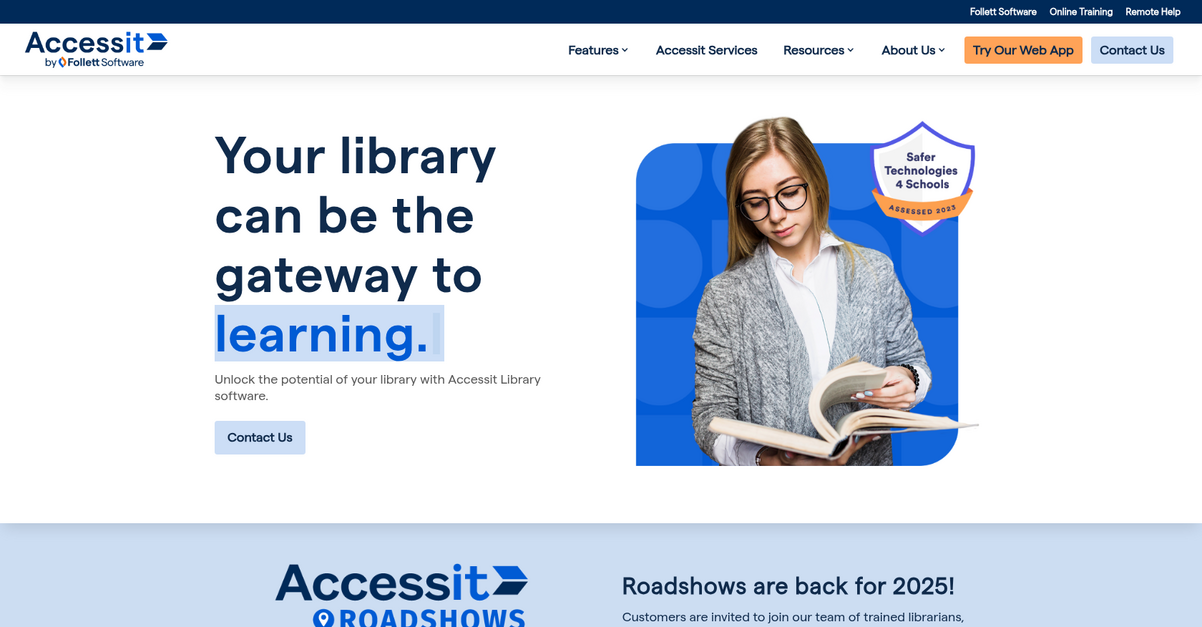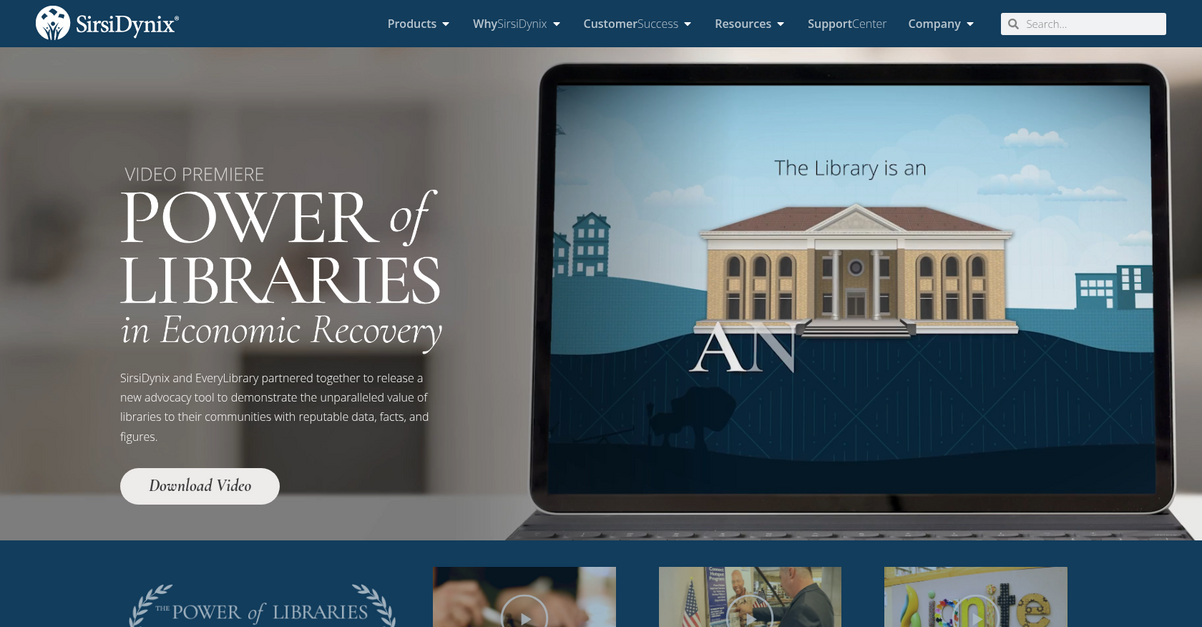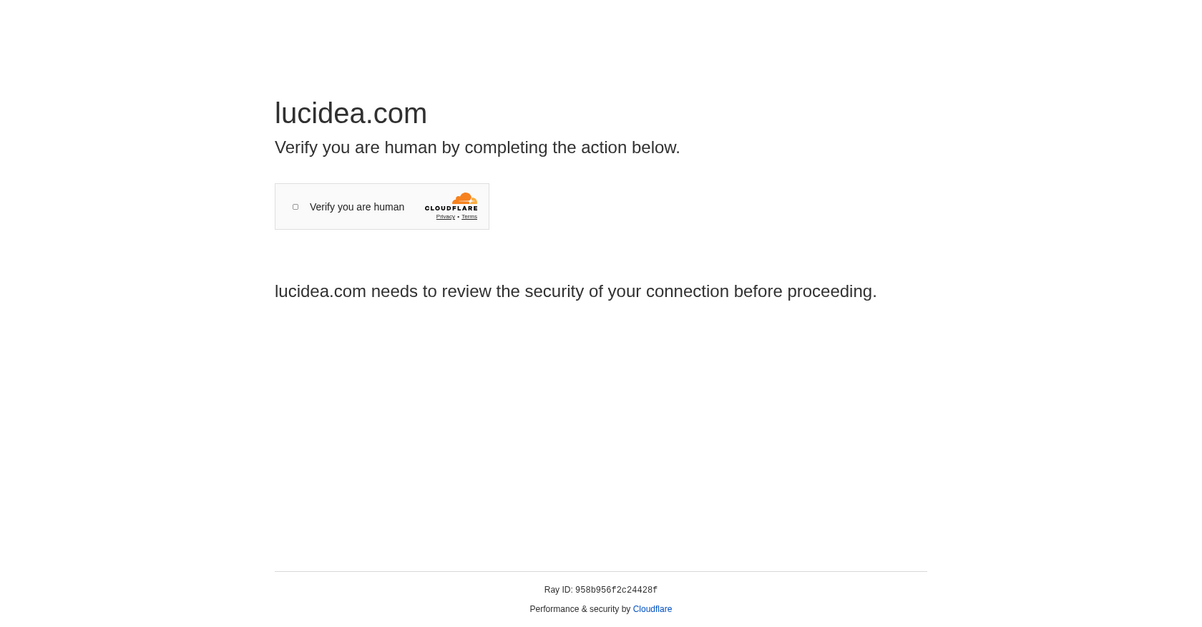Is cataloging eating up your time?
Your staff is likely bogged down with tedious manual data entry, leaving little time to assist patrons or manage other critical library services.
Outdated systems lead to circulation errors and patron frustration, preventing you from improving your library’s service and demonstrating clear value to stakeholders.
A study by Maine InfoNet found that 30% of librarian time is often spent on cataloging alone. This inefficiency pulls valuable resources away from essential patron-facing roles.
But here’s the good news. The right software can streamline your entire cataloging process, freeing your team for higher-impact work with patrons.
In this article, I’ll review the best library management software to help you make the right choice. These tools are designed to simplify operations.
You’ll discover powerful solutions that provide robust analytics, enhance patron experiences, and ultimately demonstrate a clear return on your technology investment.
Let’s get started.
Quick Summary:
| # | Software | Rating | Best For |
|---|---|---|---|
| 1 | Follett → | School libraries and districts | |
| 2 | CodeAchi → | Medium educational libraries | |
| 3 | Accessit → | Schools and educators | |
| 4 | Springshare → | Academic and public libraries | |
| 5 | SirsiDynix → | Public and academic libraries |
1. Follett

Struggling with complex library management and outdated systems?
Follett offers a connected suite for streamlining complex processes, perfect for your library’s needs.
I know you want to enhance patron experiences and reduce lost records, and Follett helps by bringing all your schools’ resources and information together.
Discover solutions that simplify challenges for you.
Follett’s Destiny Educator Platform delivers unified, consistent experiences across all product lines, empowering new possibilities to save money and time. This integrated approach ensures you get more out of your existing resources.
The Library Suite, featuring Destiny Library Manager and Accessit Library, allows you to manage library resources and offer relevant media that engages students, keeping your collection current. Additionally, Destiny AI offers instant insights, helping you spark new ideas and increase engagement within your library and broader district operations.
This cohesive platform helps you track inventory, improve resource utilization, and simplify operations, ultimately boosting student success and educator satisfaction.
While this software focuses on library operations, efficiently managing your team’s time is also crucial. My article on best leave management system can help.
Key features:
- Destiny Educator Platform: Provides a connected suite of solutions for streamlining complex processes and bringing all your school’s resources and information together.
- Library Suite with Destiny Library Manager: Helps you manage library resources, track inventory, and offer relevant media that genuinely engages your students and patrons.
- Destiny AI and Cloud Hosting: Offers instant insights, sparks new ideas, and provides a reliable, secure, and scalable cloud environment for your library’s operations.
Learn more about Follett features, pricing, & alternatives →
Verdict: Follett’s integrated Library Suite and Destiny Educator Platform addresses core challenges like inefficient cataloging and data management. With features like Destiny AI and unified navigation, it helps you streamline operations and enhance patron experience, making it a strong contender for best library management software.
2. CodeAchi

Are your current library operations causing more headaches than help?
You might be struggling with a complex catalog or lost records, but CodeAchi offers a comprehensive solution. This software simplifies your entire library management process, from cataloging to patron data. It directly addresses the pain points of outdated systems. It ensures smooth, efficient library management, so you can focus on service.
Let CodeAchi streamline your library operations.
CodeAchi is designed to solve your operational challenges, giving you robust tools for every aspect of library management. It provides a user-friendly interface that simplifies even the most complex tasks, making daily workflows more efficient. For example, you can easily handle book issues and returns with precise tracking, ensuring no book is ever truly lost.
This software also provides detailed reports, allowing you to gain valuable insights into your library’s usage and performance. You can manage student and staff data, maintain clear records, and integrate various functions seamlessly, helping you meet evolving educational and community needs while enhancing overall patron satisfaction.
Before diving deeper, you might find my analysis of best campaign management software helpful for broader data insights.
Key features:
- Simplified Cataloging: Effortlessly manage and organize your entire book collection, reducing lost records and ensuring accurate inventory tracking for improved efficiency.
- Efficient Circulation: Streamline book issues and returns with precise tracking, saving your staff significant time and enhancing the overall patron experience.
- Robust Reporting: Gain valuable insights into library usage and performance through detailed reports, helping you make informed decisions and demonstrate clear ROI.
Learn more about CodeAchi features, pricing, & alternatives →
Verdict: CodeAchi offers a comprehensive solution for library administrators, streamlining cataloging, circulation, and reporting. Its focus on efficiency and detailed record-keeping makes it a strong contender for the best library management software, helping you enhance patron experiences and achieve clear ROI.
3. Accessit

Struggling with outdated library systems and lost records?
Accessit Library software streamlines your operations, helping you manage resources and automate tasks with ease.
This innovative solution helps you overcome challenges like inefficient circulation and limited reporting, freeing you to inspire readers and enhance learning experiences.
Unlock your library’s full potential.
Accessit simplifies your daily workflows, allowing you to focus on patron needs and educational impact. It provides intuitive tools for both librarians and IT managers, making asset tracking and cataloging straightforward.
You can enhance resource management and empower students with engaging learning resources available anywhere, anytime, fostering a love of reading and research. The system seamlessly integrates with essential platforms like SSO and student management systems. This flexible and dependable software empowers educators across various roles, driving student success.
Accessit delivers a robust, user-friendly package, adapting to diverse demands for both students and staff.
While we’re discussing comprehensive management systems, you might also find insights in my guide on best advanced distribution management system.
Key features:
- Streamlined Operations: Automate library tasks, from cataloging to circulation, allowing your team to focus on inspiring readers and enriching learning experiences.
- Robust Integrations: Connect seamlessly with your existing tech stack, including SSO and student management systems, ensuring frictionless information flow across platforms.
- Intuitive User Experience: Provide an easy-to-use interface for students and staff, enabling access to resources and management capabilities from any device, anywhere.
Learn more about Accessit features, pricing, & alternatives →
Verdict: Accessit Library offers intuitive design and powerful automation, making it suitable as the best library management software for schools. Its seamless integrations and dedicated support team ensure operational efficiency and enhanced student engagement, proving investment impact for principals and IT managers.
4. Springshare

Struggling with outdated library systems and lost records?
Springshare offers a suite of tools like LibGuides and LibAnswers, designed to simplify content management and communication, directly addressing your core pain points.
This platform empowers you to create content, curate resources, and answer questions, enabling your organization to thrive in a digital-first world.
It’s time to transform your library.
Springshare’s LibApps platform provides an affordable, easy-to-use solution for building strong online services. You can manage everything from subject guides and data analysis with LibInsight to event calendars with LibCal and chat-with-a-librarian services via LibAnswers.
Their tools focus on connecting your users to valuable resources, allowing you to streamline operations and enhance the patron experience. For instance, LibMaps bridges the gap to help patrons navigate your physical library and collections, while LibConnect Pro uses ILS data to segment audiences and automate personalized marketing campaigns. LibStaffer simplifies staff scheduling and communication.
With Springshare, you gain a robust system for managing resources, engaging patrons, and improving internal productivity.
If you’re also looking for ways to streamline staff management, my guide on PTO tracking solutions can provide valuable insights.
Key features:
- Comprehensive Content Management: LibGuides and LibSites enable you to build and curate guides, manage A-Z database lists, and create dynamic, personalized library websites with ease.
- Multi-channel Patron Engagement: LibAnswers and LibChat offer an integrated platform for FAQs, email, SMS, and embeddable chat widgets, ensuring you can answer patron questions from any channel.
- Data-Driven Decision Making: LibInsight provides powerful data collection and visualization tools, allowing you to create custom datasets and exhibit your organizational value through evidence.
Learn more about Springshare features, pricing, & alternatives →
Verdict: Springshare offers a holistic, user-friendly platform that addresses common library challenges, making it an excellent candidate for the best library management software. With offerings like LibInsight for analytics and 24/7 librarian co-op support, it empowers your library to enhance services and impress users.
5. SirsiDynix

Struggling with outdated library systems?
You might find yourself battling inefficient cataloging and limited reporting capabilities, hindering your ability to serve your community effectively. SirsiDynix directly addresses these frustrations with its comprehensive BLUEcloud modules, streamlining operations. You can overcome the challenge of managing growing collections with their specialized tools for library automation and discovery.
It’s time to discover your solution.
SirsiDynix helps you fulfill your mission by making your collection, services, and programming visible. Their BLUEcloud suite offers specific modules like BLUEcloud Cataloging, Circulation, and Analytics to enhance your daily operations. These tools ensure seamless management of patron data and provide robust reporting capabilities for informed decision-making. You can also leverage BLUEcloud Mobile2 for an intuitive mobile experience, making your library accessible and engaging for your community. Regardless of your existing SirsiDynix ILS, BLUEcloud is ready to integrate, ensuring your library stays current and impactful.
You’ll always have an ally.
Key features:
- Comprehensive Library Systems: Includes BLUEcloud, Symphony, and Horizon, providing core automation for public, academic, K-12, consortia, and special libraries, simplifying complex processes.
- Integrated Modules: Features BLUEcloud Cataloging, Circulation, and Analytics, offering specific tools for managing collections, patron data, and gaining insights, enhancing operational efficiency.
- Mobile and Discovery Solutions: Offers BLUEcloud Mobile2 and robust discovery tools to improve patron experience, making resources easily accessible and promoting library services.
Learn more about SirsiDynix features, pricing, & alternatives →
Verdict: SirsiDynix provides robust library management software tailored to address the core challenges of cataloging, circulation, and patron engagement. With its comprehensive BLUEcloud suite and specialized modules like BLUEcloud Analytics, you can streamline operations and demonstrate value, making it a strong contender for the best library management software.
6. OCLC

Struggling to manage your library’s expanding resources?
OCLC offers comprehensive software designed to centralize cataloging and improve your operational workflows.
You can streamline your daily tasks across all library types, from public to academic, ensuring accuracy and efficiency.
Let’s explore how OCLC helps.
OCLC’s solutions help you improve resource discovery and access for your patrons. You can simplify complex cataloging processes, which frees up your staff.
This gives you more time to focus on patron engagement and developing valuable library programs. You also get robust analytics and reporting to track performance.
This leads to better decision-making and helps your organization adapt to evolving educational and community needs, enhancing overall library service.
Your library will truly thrive.
While discussing how libraries engage with patrons, you might also find my analysis of the best patient engagement software helpful for healthcare organizations.
Key features:
- Centralized Cataloging Tools: Simplifies managing diverse collections and ensures accurate, consistent records for all your library’s resources.
- Enhanced Patron Access: Improves resource discovery and access, giving your users intuitive ways to find and utilize library materials efficiently.
- Comprehensive Workflow Solutions: Streamlines daily operations from cataloging to reporting, boosting staff productivity and overall library efficiency.
Learn more about OCLC features, pricing, & alternatives →
Verdict: OCLC provides comprehensive tools that empower library administrators to tackle cataloging and operational challenges. Its integrated approach, focusing on streamlining workflows and enhancing patron experiences, makes it a strong contender for the best library management software, demonstrating clear ROI through improved efficiency.
7. Lucidea

Struggling with outdated library systems and lost records?
Lucidea offers specialized integrated library systems like SydneyDigital and GeniePlus, designed for agile, digital-first special libraries. These solutions tackle inefficient circulation and limited reporting.
You can streamline your cataloging and boost patron service, ensuring immediate returns on your investment by adopting purpose-built workflows and powerful information access.
Discover your path to simplified information.
Lucidea’s solutions empower you to capture, curate, and connect people to organizational intelligence, transforming your information assets into searchable, social, and accessible resources. With features for comprehensive collections management, you can enhance patron experiences through intuitive interfaces.
Their applications, like ArchivEra for archives and Argus for museums, provide dynamic online presence with full multimedia support. They also offer robust analytics and a single authoritative venue for managing knowledge, helping you eliminate cataloging backlogs and build multimedia collections for user success.
You will find the perfect fit.
Key features:
- Integrated Library Systems: Offers SydneyDigital for multinational libraries and GeniePlus for agile, essential ILS, providing powerful information access and discovery capabilities.
- Specialized CMS: Provides ArchivEra for innovative archives and Argus for forward-thinking museums, ensuring comprehensive collections management and multimedia support.
- Knowledge Management Platforms: Includes Presto for web-based, social KM and Inmagic DB/TextWorks for flexible textbase KM, connecting people to organizational intelligence.
Learn more about Lucidea features, pricing, & alternatives →
Verdict: Lucidea stands out as a strong contender for the best library management software, offering purpose-built solutions for special libraries, archives, and museums. With over 3,000 customers in 50 countries, their comprehensive features simplify cataloging, enhance patron experiences, and provide robust analytics for your organization’s unique needs.
8. MLA Solutions

Struggling with outdated library management systems?
MLA Solutions offers robust tools to simplify your cataloging and boost service, transforming daily operations.
Their M5 and M3 systems address inefficiencies, providing new functionality and a web-friendly software architecture. This directly tackles challenges like lost records and limited reporting.
Let’s dive into how it revolutionizes library operations.
MLA Solutions is built with librarians in mind, offering a comprehensive suite for your needs.
You’ll find powerful cataloging features like add, copy, edit, and delete records, along with MARC Records Import and Export capabilities, ensuring data accuracy. The optional Textbook Module and Equipment database further expand its utility.
Beyond cataloging, MLA Solutions simplifies circulation with features like a Circulation Calendar, Fine Calculation, and Self Check-in/Check-out, streamlining patron interactions. Its [inventory and reporting tools], including custom report creation with email delivery, provide the insights you need for better resource management.
Achieve peak efficiency and patron satisfaction.
While we’re discussing efficient software systems, optimizing your underlying [data center management software] is crucial for robust performance.
Key features:
- Comprehensive Cataloging: Easily add, copy, edit, and delete records, with MARC import/export and customizable templates for efficient organization.
- Streamlined Circulation: Manage loans, returns, fines, bookings, and holds with features like Self Check-in/Check-out and detailed item/patron history.
- Robust Inventory & Reporting: Conduct full or partial inventories and create custom reports delivered as PDFs, enhancing data-driven decision-making.
Learn more about MLA Solutions features, pricing, & alternatives →
Verdict: MLA Solutions, with its web-friendly architecture and focus on librarian needs, offers a comprehensive platform for cataloging, circulation, and reporting. Its features, like customizable templates and detailed history tracking, make it an ideal choice if you seek the best library management software for efficiency and enhanced patron service.
9. The Library Corporation

Are your current library systems causing more headaches than help? You need solutions to streamline cataloging and boost service.
The Library Corporation offers robust software like Library•Solution and CARL•Solution to address these pain points.
Their high-performance, cloud-based infrastructure and mobile solutions mean you can focus on your patrons, not managing outdated technology. Your library’s goals are within reach with integrated support.
So, how can they help you achieve those goals?
The Library Corporation provides essential tools designed to enhance both staff efficiency and patron experiences.
Their ITS•MARC online copy cataloging resource, with access to 81 million records, simplifies your cataloging and ensures accuracy. It makes adding new resources, even eBooks, incredibly easy for your team and discoverable for your borrowers.
With solutions like TLC Cloud Services, powered by Oracle Cloud Infrastructure and managed by library experts, and the TLC•Go mobile app, you can extend your library’s reach. This comprehensive approach means better resource utilization and improved patron satisfaction.
Simplify your operations and enhance patron access.
While we’re discussing optimizing operations, my article on integrated distribution systems explores how to streamline your supply chain for better efficiency.
Key features:
- Robust software solutions: Library•Solution and CARL•Solution provide comprehensive, integrated library management, ensuring efficient cataloging and circulation processes.
- Extensive cataloging resources: ITS•MARC offers access to 81 million records, streamlining copy cataloging and ensuring accurate, timely additions to your collection.
- Cloud and mobile accessibility: TLC Cloud Services and TLC•Go mobile app deliver high-performance, cloud-based infrastructure and mobile access, enhancing service and patron engagement.
Learn more about The Library Corporation features, pricing, & alternatives →
Verdict: The Library Corporation offers integrated, cloud-based software that empowers library administrators to overcome daily frustrations. With tools like ITS•MARC and a mobile app, it simplifies cataloging and enhances patron access, making it a strong contender for the best library management software to achieve your operational goals and increase satisfaction.
Conclusion
Your cataloging process feels outdated.
Choosing the right software is a real challenge. Many systems focus on internal metrics that don’t actually improve patron experience or resource discovery.
OCLC Research highlights how traditional cataloging metrics fail to measure end-user impact. This often incentivizes low-value workflows that get in the way. You need a system that prioritizes quality.
Here’s my top recommendation for you.
From my analysis, LibraryThing is the standout choice. It shifts the focus from simple data entry to creating a rich, socially discoverable catalog for your patrons.
Its community-driven approach makes it the best library management software for truly enhancing resource discovery. You’re not just cataloging; you’re building a more engaging library experience.
I suggest you visit the LibraryThing website to explore its unique features and see how it can transform your library’s service.
Your patrons will love the difference.






